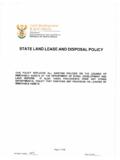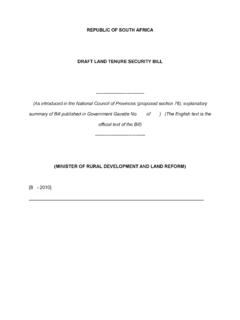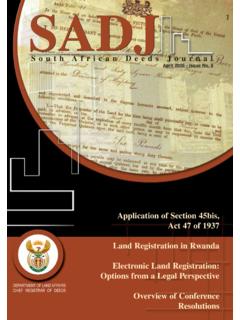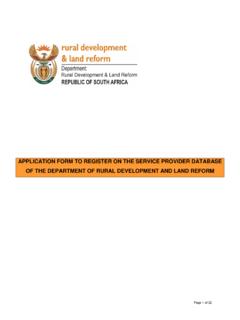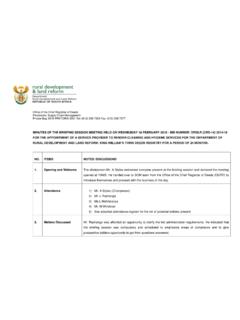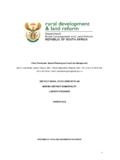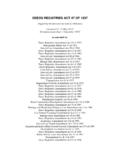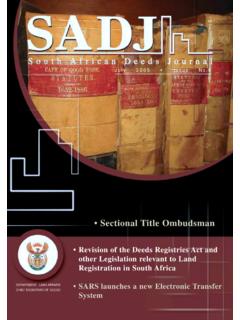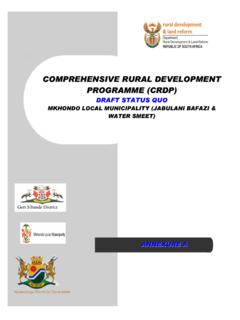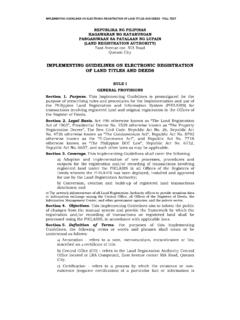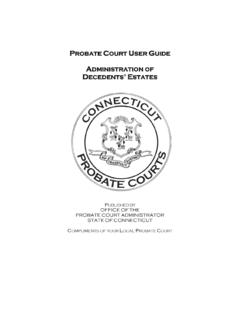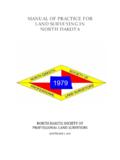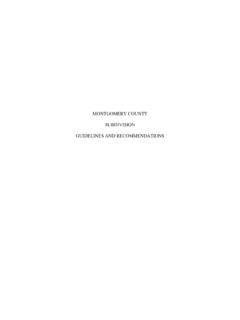Transcription of EXTENSION OF SECURITY OF TENURE ACT 62 OF …
1 EXTENSION OF SECURITY OF TENURE ACT 62 OF 1997 (Afrikaans text signed by the President) [Assented To: 19 November 1997] [Commencement Date: 28 November 1997] as amended by: Prevention of Illegal Eviction from and Unlawful Occupation of land Act 19 of 1998 land Affairs General Amendment Act 61 of 1998 land Affairs General Amendment Act 11 of 2000 land Affairs General Amendment Act 51 of 2001 ACT To provide for measures with State assistance to facilitate long-term SECURITY of land TENURE ; to regulate the conditions of residence on certain land ; to regulate the conditions on and circumstances under which the right of persons to reside on land may be terminated; and to regulate the conditions and circumstances under which persons, whose right of residence has been terminated, may be evicted from land ; and to provide for matters connected therewith.
2 WHEREAS many South Africans do not have secure TENURE of their homes and the land which they use and are therefore vulnerable to unfair eviction; WHEREAS unfair evictions lead to great hardship, conflict and social instability; WHEREAS this situation is in part the result of past discriminatory laws and practices; AND WHEREAS it is desirable - that the law should promote the achievement of long-term SECURITY of TENURE for occupiers of land , where possible through the joint efforts of occupiers, land owners, and government bodies; that the law should extend the rights of occupiers, while giving due recognition to the rights, duties and legitimate interests of owners; that the law should regulate the eviction of vulnerable occupiers from land in a fair manner, while recognising the right of land owners to apply to court for an eviction order in appropriate circumstances; to ensure that occupiers are not further prejudiced; ARRANGEMENT OF SECTIONS CHAPTER I INTRODUCTORY PROVISIONS 1.
3 Definitions 2. Application and implementation of Act 3. Consent to reside on land CHAPTER II MEASURES TO FACILITATE LONG-TERM SECURITY OF TENURE FOR OCCUPIERS 4. Subsidies CHAPTER III RIGHTS AND DUTIES OF OCCUPIERS AND OWNERS 5. Fundamental rights 6. Rights and duties of occupier 7. Rights and duties of owner CHAPTER IV TERMINATION OF RIGHT OF RESIDENCE AND EVICTION 8. Termination of right of residence 9. Limitation on eviction 10. Order for eviction of person who was occupier on 4 February 1997 11. Order for eviction of person who becomes occupier after 4 February 1997 12. Further provisions regarding eviction 13. Effect of order for eviction 14. Restoration of residence and use of land and payment of damages 15.
4 Urgent proceedings for eviction CHAPTER V DISPUTE RESOLUTION AND COURTS 16. Pending proceedings 17. Choice of court 18. Powers of court 19. Magistrates courts 20. land Claims Court 21. Mediation 22. Arbitration 23. Offences CHAPTER VI MISCELLANEOUS PROVISIONS 24. Subsequent owners 25. Legal status of agreements 26. Expropriation Act 27. Trespass Act, 1959 28. Regulations and guidelines 29. Amendment of laws 30. Short title Schedule - Laws amended by section 29 CHAPTER I INTRODUCTORY PROVISIONS (General: Decided cases) (Section 1: Decided cases) 1. Definitions (Section 1(1): Decided cases) (1) In this Act, unless the context indicates otherwise - consent means express or tacit consent of the owner or person in charge of the land in question, and in relation to a proposed termination of the right of residence or eviction by a holder of mineral rights, includes the express or tacit consent of such holder; Constitution means the Constitution of the Republic of South Africa, 1996 (Act No.)
5 108 of 1996); court means a competent court having jurisdiction in terms of this Act, including a Special Tribunal established under section 2 of the Special Investigating Units and Special Tribunals Act, 1996 (Act No. 74 of 1996); [Definition of court substituted by s. 20 of Act 61/98] Director-General means the Director-General of the Department of land Affairs or an officer of that Department who has been designated by the said Director-General either generally or in respect of a particular case, or in respect of cases of a particular nature; employee means an employee in terms of the Labour Relations Act; established practice means a practice in terms of which the owner or person in charge or his or her predecessor in title routinely gave permission to people residing on the land to bury deceased members of their family on that land in accordance with their religion or cultural belief; [Definition of established practice inserted by s.]
6 6 of Act 51/2001] evict means to deprive a person against his or her will of residence on land or the use of land or access to water which is linked to a right of residence in terms of this Act, and eviction has a corresponding meaning; land Claims Court means the court established by section 22 of the Restitution of land Rights Act, 1994 (Act No. 22 of 1994); Minister means the Minister responsible for land Affairs or an officer of the Department of land Affairs who has been designated by the Minister either generally or in respect of a particular case, or in respect of cases of a particular nature: Provided that the powers referred to in section 28 shall be excluded from any such designation; municipality means a municipality in terms of section 10B of the Local Government Transition Act, 1993 (Act No.)
7 209 of 1993); occupier means a person residing on land which belongs to another person, and who has or on 4 February 1997 or thereafter had consent or another right in law to do so, but excluding - (a) .. (b) a person using or intending to use the land in question mainly for industrial, mining, commercial or commercial farming purposes, but including a person who works the land himself or herself and does not employ any person who is not a member of his or her family; and (c) a person who has an income in excess of the prescribed amount; [Definition of occupier amended by s. 20 of Act 61/98 and s. 6 of Act 51/2001] off-site development means a development which provides the occupants thereof with an independent TENURE right on land owned by someone other than the owner of the land on which they resided immediately prior to such development; on-site development means a development which provides the occupants thereof with an independent TENURE right on land on which they reside or previously resided.
8 Owner means the owner of the land at the time of the relevant act, omission or conduct, and includes, in relation to the proposed termination of a right of residence by a holder of mineral rights, such holder in so far as such holder is by law entitled to grant or terminate a right of residence or any associated rights in respect of such land , or to evict a person occupying such land ; person in charge means a person who at the time of the relevant act, omission or conduct had or has legal authority to give consent to a person to reside on the land in question; prescribed means prescribed by regulation; regulation means a regulation made under this Act; suitable alternative accommodation means alternative accommodation which is safe and overall not less favourable than the occupiers previous situation, having regard to the residential accommodation and land for agricultural use available to them prior to eviction, and suitable having regard to - (a) the reasonable needs and requirements of all of the occupiers in the household in question for residential accommodation, land for agricultural use, and services; (b) their joint earning abilities; and (c) the need to reside in proximity to opportunities for employment or other economic activities if they intend to be economically active; terminate includes to withdraw consent to a person to occupy or use land .
9 The Labour Relations Act means the Labour Relations Act, 1995 (Act No. 66 of 1995); this Act includes the regulations. (2) In respect of unalienated State land , unsurveyed State land , or land registered in the name of the State or an institution or functionary exercising powers on behalf of the State - (a) owner or person in charge includes a person who has been certified by the Director-General, on application made in the prescribed manner, to be the owner or person in charge, subject to the conditions that the Director-General may determine; and (b) a certificate purporting to have been issued by the Director-General in terms of paragraph (a) shall constitute prima facie evidence of the authority of the person named in it to act as owner or person in charge of the land concerned, and shall be admissible in evidence on its production in a court.
10 (Section 2: Decided cases) 2. Application and implementation of Act (Section 2(1): Decided cases) (1) Subject to the provisions of section 4, this Act shall apply to all land other than land in a township established, approved, proclaimed or otherwise recognised as such in terms of any law, or encircled by such a township or townships, but including - (a) any land within such a township which has been designated for agricultural purposes in terms of any law; and (b) any land within such a township which has been established, approved, proclaimed or otherwise recognised after 4 February 1997, in respect only of a person who was an occupier immediately prior to such establishment, approval, proclamation or recognition. (Section 2(2): Decided cases) (2) land in issue in any civil proceedings in terms of this Act shall be presumed to fall within the scope of the Act unless the contrary is proved.

